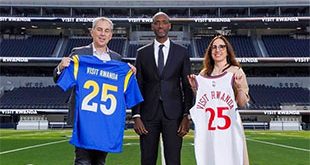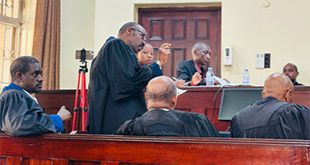
By Haggai Matsiko
West, Central dominate juicy public jobs
Jitters over tribalism linger as Museveni caps 28 years in power
A story was told recently of a major government institution where the top managers conduct their meetings in a local language with English interspersed in between once in a while. This prompted The Independent to conduct a mini-survey of the 425 top government appointments to determine the level of ethnic balance in government institutions and bodies. The findings are indeed an eye-opener to the fact that high level sectarianism is still alive and kicking in Uganda.

Yet, the “consolidation of national unity and elimination of all forms of sectarianism” was point number three on the NRM’s Ten Point Programme – a blue-print for “a nationwide coalition of political and social forces that could usher in a new and better future for the long-suffering people of Uganda.” The survey found that Ugandans from the west hold 181 top government jobs almost double what their colleagues from the central hold (107), leaving only 68 and 69 jobs for those from the north and east respectively.
The Independent looked at the distribution of appointments of Ministers, Permanent Secretaries, Resident District Commissioners (RDCs) and their deputies, Presidential Advisors and the top management of the three security organs, the Police, UPDF and Prisons.
The survey reveals that people from western Uganda are not only heads of most of the institutions; they also have the largest share of the top jobs in all the surveyed entities.
Prior to capturing power in 1986, President Museveni’s NRM/NRA vowed to eradicate tribalism, religionism, linguistic groupings, regionalism and chauvinism arguing that one of the principle causes of strife in Uganda and Africa in general has been lack of national unity. But a look at the top jobs tells a different story.
From the top, President Museveni, Prime Minister Amama Mbabazi, first deputy premier and Public Service, Henry Kajura, Foreign Affairs Minister, Sam Kutesa, Justice Minister, Kahinda Otafiire, Health Minister Ruhakana Rugunda, his deputy Elioda Tumwesigye, Defence Minister, Crispus Kiyonga among others all hail from the western region.
Vice President Edward Kiwanuka Sekandi, Attorney General Peter Nyombi, Trade Minister Amelia Kyambadde and Finance Minister Maria Kiwanuka are amongst the top ministers from the central region.
The north has mainly, the Second Deputy Prime Minister, Moses Ali, Minister of state for energy, Simon D’ujanga, Minister without Portfolio, Richard Todwong amongst its 12 ministers. And the East has Lands Minister Daudi Migereko, Education Minister, Jessica Arupo, Energy Minister, Irene Muloni amongst its 17 ministers.
The other top offices considered were that of the Speaker of parliament, Rebecca Kadaga who hails from the east, Auditor General, John Muwanga, central, Inspectorate of Government Irene Mulyagonja, east and the Director of Public Prosecutions also from the east.
Under security agencies; in Police, General Kale Kayihura and six top directors all hail from the west. The central region only has two directors, north three directors and east also two directors.
Five commanders from the west also dominate the UPDF, which is headed by General Katumba Wamala, the Chief of Defence Forces (CDF) from the central and his deputy Charles Angina, from the East.
In Prisons, John Byabasaija, the head of Uganda Prisons, and two other top bosses come from the west, two from central, one from the north and one from the east.
Amongst permanent secretaries, eight hail from the west, six from central, six from the east and five from the north. The findings also revealed that that 20 heads of the 38 Commissions, Authorities and Corporations surveyed were from the west, 15 from the central and three from the east.
The findings will shed more light on the tribalism monster, which has stuck around for the three decades since President Yoweri Museveni has been in power.
While Museveni has always warned against tribalism, critics accuse him of inspiring the bug that has deeply percolated the Ugandan social fabric to an extent that one’s religion or tribe; best determine how fast they get a vacancy in a school, a service or a job at an institution public or private.
Parliament, which ideally should be the one to deal with such tendencies, has been co-opted. Last year, two committee chairpersons, a commissioner and a deputy clerk, were amongst those accused of influencing the hiring of their relatives. The allegations were so alarming that Speaker Rebecca Kadaga was reportedly forced to instruct a three-man committee to investigate cases of influence-peddling in the way people were getting jobs.
Just two weeks ago, Makerere Vice Chancellor Prof. Mondo Kagonyera told Saturday Monitor that tribalism was threatening the country’s biggest public academic institution.
Critics say President Museveni has walked the talk. He appointed his wife, Janet Museveni, the Minister for Karamoja Affairs, his son, Muhoozi Kainerugaba, is the Commander of the Special Forces Command (SFC), his brother, Caleb Akandwanaho, is a Presidential Advisor and also a former minister, while his other in-laws hold jobs in different capacities.
A touchy issue, tribalism keeps staring its ugly head. In a country with over 50 tribes, it has sparked some of the worst riots. Just a month ago, the two districts of Kasese and Bundibujo experienced some of the worst killings as security operatives repulsed attacks from supporters of the Rwenzururu Kingdom, who had attacked security installations apparently to make a statement in defence of their kingdom.
The attacks came barely five years after the deadly Buganda riots of September 2009, which too resulted from a dispute between the leadership of Uganda’s biggest tribal establishment—Buganda—and the central government.
While President Museveni likes to warn against tribalism, his critics say he is partly to blame for presiding over an establishment that favours one or two tribes over the others.
Institutionalised sectarianism?
Museveni’s supporters often trash tribalism claims as “diversionary,” arguing that President Museveni is not to blame since his appointments are approved by Appointments Committee of Parliament. Many are not ready to buy into this argument.
Prof. Morris Ogenga Latigo, the former Leader of Opposition (LoP), says it does not matter whether Parliament approves them or not.
“It doesn’t matter who appoints or who approves,” Latigo says, “the bias in these appointments is undisputable and will always manifest itself as long as President Museveni is still in power.”
Latigo says that there are people who will always be there as long as President Museveni is in power.
“This bias came about because a group of people from the west and some from the central came from the bush and captured power and this has been carried on throughout all the appointments,” Latigo adds.
The former LoP argues that arrangements like that of revolutionaries do not break easily compared to political alliances. Only regular democratic change of government would deal nepotism and tribalism a death blow.
“For instance, if Muntu becomes president through a political alliance with people like Latigo,” the former LoP says, “even though he is from the west, he would consider all the allies from other regions.”
When Muntu leaves power, Latigo adds, another president also comes with his own alliances and as a result, people from other regions also benefit.
The lesson is that these imbalances are corrected through regular change of government.
He cites as an example of Nigeria where, when a president comes from the north, people of the north dominate government and when he is from the south, people of the south do the same, thus in the process correcting the imbalances.
“But now how do you expect the regional imbalances to be corrected when you have a president who has been in power for almost 30 years?” Latigo asks rhetorically.
The sad part, Latigo adds, is Ugandans no longer care, their attitude is that they can’t change anything as long as Museveni is still in power; they have decided to let him be and wait for their turn when he eventually leaves power.
Aol Betty Ocan, the Gulu Woman MP, who sits on Parliament’s Appointment’s Committee, has personally raised this issue before the president.
“When I raised this issue at State House before the president,” the legislator says, “President Museveni said that I was being tribalistic but this is an issue that bothers us.”
Government defence
Information Minister Rosemary Namayanja admits that the NRM government is not where it wants to be as far as this subject is concerned but that the government has made a lot of progress.
“There is no government that has tried to unite people as the NRM government,” Namayanja says.
As you know, Namayanja explains, in the past, parties were formed on the basis of religion and tribal affiliations. UPC was for Protestants and other tribal groups. DP was predominantly Catholics and for Baganda.
“But today, people support parties without these considerations,” she says, adding, “For instance, in the 2006 elections, Kizza Besigye, a westerner, swept the north and also in 2011, he swept Teso.”
Namayanja adds that for the NRM government, meritocracy is the “first consideration.”
“I am not a daughter of any of the historicals,” Namayanja says, “but I am where I am, I believe, because of merit.”
But Aol struggles to believe that. She raised the matter in 2012, at State House as her committee appeared before the President to resolve the impasse over the appointment of General Aronda Nyakairima as the internal affairs minister, and Elioda Tumwesigye as the state minister for health.
Legislators such as Aol had issues with the fact that the two appointees were all from the west, which they claimed was unfair to other regions.
This was not the first time Museveni was facing legislators over the tribalism issue.
At an NRM party National Executive Council (NEC) meeting at State House Entebbe in January 2010, President Museveni warned delegates that his government would not tolerate anybody propagating and practising sectarianism.
But in the afternoon, as delegates reacted to his speech, a delegate from Adjuman, Angela Kebba, shot up and put the President on the spot.
She asked Museveni why most people holding key government positions are from western Uganda and are closely related to him and yet he claims to be against sectarianism.
In his response, Museveni was more forthright. He explained that people from his ethnic group are dominant because of their individual contribution to the struggle that brought him to power in 1986.
He said he bases appointments on the individual’s contribution to the NRA liberation struggle and their vote popularity.
Earlier in 2007, during an NRM Parliamentary Caucus meeting in 2007, the NRM Vice Chairman for Eastern region, Mike Mukula, also told Museveni that his perceived sectarian tendencies were hurting the nation.
Sectarian nooks
In his book titled, Ethnicity, State Power and Democratisation Process in Uganda, Juma Okuku (PhD), a political scientist and senior lecturer at Makerere University, argues that the implementation of Structural Adjustment Programmes in Uganda led to reforms in the civil service, which led to the creation of new specialized agencies like URA, Civil Aviation Authority, Privatization Unit, UIA, etc. Apparently, these became breeding grounds for sectarianism.
“The negative side to the creation of these organizations was that the NRM saw it as an opportunity to reward its political and ethnic clients from the south-western part of the country with jobs,” Okuku states in the book, “This ethnically-based recruitment has raised concern.”
Another 2010 survey by The Independent found that in many organisations, if the top boss was from a particular ethnicity, key departments in the parastatal would also have heads from the boss’s home area or ethnicity.
In defence of domination of these positions by the west, some sympathisers have argued, like President Museveni, that it is because those from the western region were more educated and contributed a lot more to the NRA struggle than others.
But after three decades of liberation, this argument is no longer convincing, according to the critics.
“This is misleading,” Aol says, “You cannot say that it is only the west that has qualified people. Qualified people are everywhere; it is the way they choose who to appoint that is problematic.”
Like he did during his bush days, President Museveni still constantly speaks against sectarianism. But that is the best he does; he has not shown that he is ready to tackle the issue through his appointments, which is what his critics look at to accuse him. Instead, Museveni’s approach has been preaching patriotism and nationalism, and even legislating against sectarianism. Three years after it captured power in 1989, Museveni’s government wanted to show the political will to curb the vice when it enacted the anti-sectarian law.
But in the recent past, the legal framework has been used to gag the media, politicians and activists who criticize the practice of sectarianism.
President Museveni has also in the past defended his wife and son’s appointments. While the son had shown passion for the army, President Museveni has said his wife became minister for Karamoja because no other member of his government wanted to work in the underdeveloped region.
With such a defence, it is clear that President Museveni cannot point to many things to discredit the critics of sectarianism in his government, who accuse his government of not being any different from those that came before him.
 The Independent Uganda: You get the Truth we Pay the Price
The Independent Uganda: You get the Truth we Pay the Price





 Anthony Natif notes from Court: Uganda Vs Molly Katanga and Others 13/October/2025
Anthony Natif notes from Court: Uganda Vs Molly Katanga and Others 13/October/2025
Its an amazing article, requesting for more.